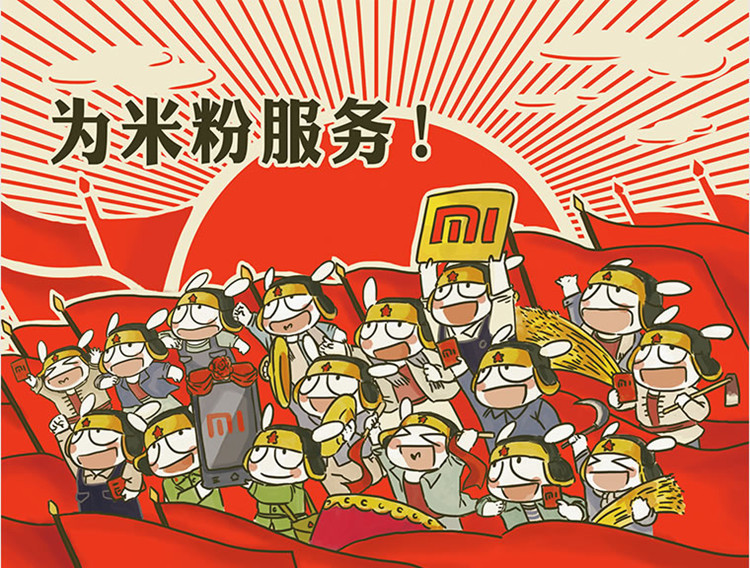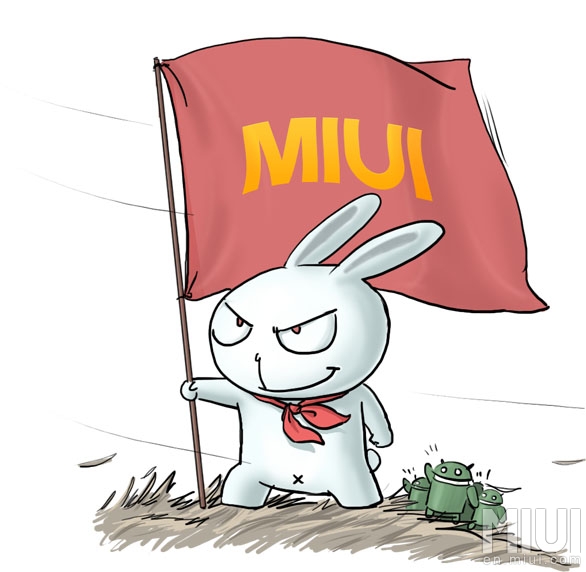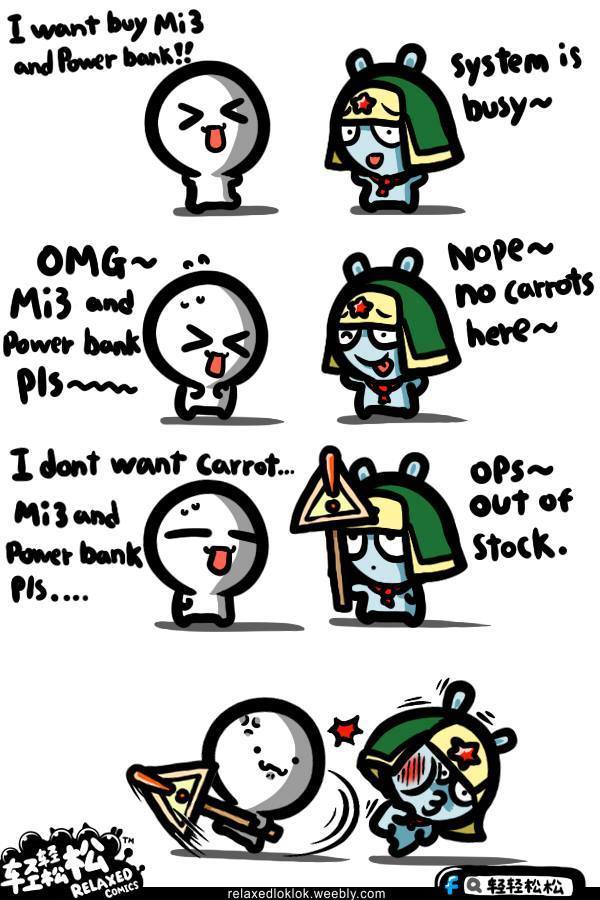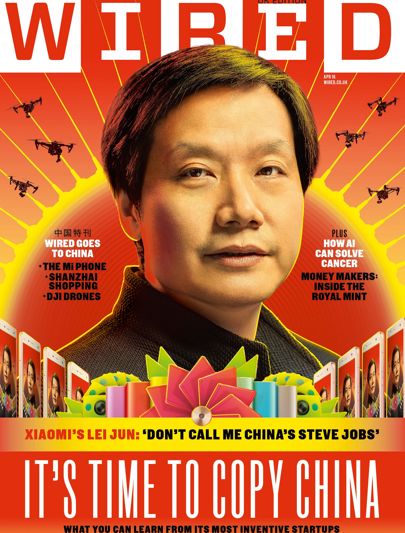Brave new world of Xiaomi
In an interview about his company, the founder of the Chinese monster Xiaomi Lei Jun compares it with a bamboo forest: while giant trees of corporations are breaking and can no longer grow back quickly, Xiaomi grows fast and in different directions - exactly as flexible bamboo does. Xiaomi was exalted and buried, Forbes wrote about them, it is compared to Apple. But the farther into this very bamboo forest, the more obvious it becomes that it is not Apple China, not a copy of Samsung ... And indeed, how can you compare the manufacturer of children's thermometers, heels and dinosaur lights with smartphones manufacturers! We do not rave - just Xiaomi has his own way, his own Zen. We decided to speculate a little about why this happened and find the secret of the Chinese economic miracle in a single corporation. All Mi hare and solid Mi-Mi-Mi!

The official Xiaomi mascot is a techno-communist with a corporate belt pass
When talking about Xiaomi, always first of all compare it with Apple: the new Apple, Chinese Apple, the killer of Apple. In fact, at the start, things were much more difficult for Xiaomi - in the markets of Asia, where he wanted to rise, Apple was an expensive pleasure. But from all sides pressed eminent Asian competitors with space budgets for advertising and marketing: Samsung, Lenovo, Asus, Philips, ZTE. Together with Xiaomi, he was growing up and threatened to become the ecosystem and comprehensive LeEco (which at the moment has passed back and got confused in search of niches). But at the same time, Xiaomi was fortunate enough to develop in China - a country with a strong economy, which has recently attracted investors, giant corporations and even manpower as a magnet.
Now, Xiaomi has more than 8,000 employees who do not sit in one of the Beijing skyscrapers, but are dispersed throughout the world, and especially in Asia: Malaysia, Singapore, and India. Soon there will be Indonesia, Brazil, the Philippines. And indeed, Xiaomi extremely values the Asian market - hence some oddities in the product line. For example, can you imagine that Apple would suddenly roll out its set of forks and spoons or, for example, a file for rough skin of the feet ? And Xiaomi - just spit! Do not believe? See for yourself - only recently we were shipped to the warehouse (by the way, if you still like something, at the end of the post coupons for the goods mentioned in the post).
Founded in 2011, by 2017, Xiaomi has become a symbol of the national economy and a source of pride for the Chinese. The path was rather winding.
Xiaomi was founded in April 2010 by former Kingsoft CEO Lei Jun as a software company creating a new custom ROM based on the Android operating system. Lay's team has set itself the task of creating additional functionality that Android has not yet offered, and to offer an easy-to-use user interface. MIUI, the firmware created by the team, gained fame and success. Starting in 2014, MIUI could be downloaded and installed on more than 200 devices in English and Chinese, even people with no development skills could easily install MIUI on their phones using the MIUI Express APK. As of the end of 2013, Xiaomi had more than 30 million MIUI users worldwide. It was a deafening start for a start-up company.

Mi Rabbit knows his stuff
And why? Because the company was created by 8 partners, and in Buddhism and in superstitious up-to-numbers China, in particular, the eight is the most magical figure symbolizing infinity (like in the joke, the eight, rotated pi-half) and the so-called octal escape route. Well, almost like 777 on Russian car numbers. In general, the eight was great. The young business was funded by Temasek Holdings Singapore Investment Group and IDG Capital, a Chinese venture capital firm, together with Qiming Venture Partners. They were one of the first companies to cooperate with the manufacturer Qualcomm - well, you understand, access to the perfect and powerful processors was open. What else does a mobile phone manufacturer need?

Show the world ... a carrot?
The conquest of the world has begun. One of the first Xiaomi devices was the Mi2 smartphone. It was the first device with a revolutionary Qualcomm Snapdragon chip on board. In the first 11 months alone, 10 million smartphones were sold, and Xiaomi became known in the markets of Australia, USA, New Zealand and, of course, Europe.

Xiaomi attacks
After the success of Mi2, Xiaomi opened the first offices in China and Singapore and proceeded to release Mi3 and Redmi. Xiaomi Mi3. And once again success: the first batch of smartphones was sold out within two minutes after the launch. Advertising was not needed - the media around the world began to talk about the new Chinese miracle. At the same time, Xiaomi looks back at the markets of rich Malaysia and more without India and the Philippines. The Indian market is triumphantly conquered - Xiaomi cooperates on it with a local large and very popular online store.
July 22, 2014 changed the mobile world forever - the next blow to the competitors was the flagship Mi4. This smartphone has become one of the best-selling in the entire history of mobile retail - gadgets rushed to the market in the middle price category, not inferior in performance to the luxury flagships of top vendors. And at the same time active intervention began, not only Xiaomi, but also Chinese phones of all kinds and nouneyms to the markets of Russia, Europe and the world.
In 2014, Xiaomi CEO Lei Jun attracted about $ 1 billion in investment through the Hong Kong investment group All-Stars Investment Limited. After that, the company value was $ 45 billion and Xiaomi became one of the most expensive corporations in the world.
The manner of surprising the market has become a habit with Xiaomi. And users got into the habit of receiving goods of excellent quality for little money - and no matter what it is: a fire sensor for $ 30.34 or an IP camera for $ 29.89 (this is a pre-order price, then it will be more expensive) or even ... a water jug with a display and 7 special filters . Everything is thought out: from electronics to design. BUT! Where do such prices come from when competitors and manufacturers in other countries are many times more expensive? Where in the range, damn it, water filters? We will understand.
Of course, the point is not in the magical eight. Xiaomi has a lot of tricks and secrets, thanks to which they develop even behind the great firewall. Moreover, the guys reject the classic marketing and advertising in principle. So, we consider the secrets (and some will not interfere with their implementation).
The first and main reason for the success of Xiaomi is what advertisers call word of mouth and are rightly considered the most effective and most difficult promotion tool. Communication with users is simply amazing - through Chinese social networks and special marketplaces such as Weibo, WeChat, Xiaomi Forum, Baidu Tieba and Xiaomi Mall. There is a whole community of enthusiasts - MiFans, where activity is constantly being held, beta tests, tickets to offline parties of fans are played out, where you can freely chat or even dance with top managers of Xiaomi. Fanaticism and evangelism are two reliable pillars of Xiaomi leadership in Asian countries, and especially in their homeland.
Xiaomi always collect feedback and listen to users. In this direction, an unprecedented scale is underway. Xiaomi data analytics in real time make predictions about the demand for the next week, based on last week's feedback and sales data, analyzing the assessment of their activities in social networks. Production resources are adjusted and optimized accordingly - everything changes on the fly.
Xiaomi has 30 million registered users in one of the communication channels. There is also a loyalty program with a bunch of bonuses and rewards. During tests of new devices, whether it be a TV or a smartphone, 500 people of beta testers can buy gadgets for $ 0.16. And this is not so much testing (although it is important, and even not very expensive), as the opportunity to make the first sowing of information about the new product - the whole community is waiting for feedback from the lucky beta testers.

Xiaomi do not have physical stores in any part of the globe - preference is given to online stores and its own online store, popular in China. This is a huge, colossal savings on warehouse and trade costs: neither you personnel, the hall, the cash register, security, packaging, shop windows, etc. By the way, compare the Russian, English and Chinese versions of the official site Xiaomi. You will see that in the Chinese version - this is not a trendy corporate website with designer photos, but the very online store. Why all this corporate pride, when there is no time to explain and need to sell!
The company is dominated by an exceptional work discipline - so, from October 2016, the company switched to the six-day working week with a 12-hour working day, from 9 am to 9 pm. Are you still waiting for Friday?
Xiaomi is produced in small batches, akin to the well-known “just-in-time” production technology (kanban), which became popular for the first time thanks to Toyota's Lean Manufacturing principles. The company keeps its stocks small and maintains a flexible procurement cycle from its extensive network of suppliers. This is again a savings already in the production warehouse and at the same time minimizing the costs that could arise from overstocking.
However, something that, and Xiaomi glut is not threatened. So, we can recall the record sales of the company's smartphones: 50,000 in 25 seconds at the start of sales in India, December 8, 2011 100,000 phones within three hours, April 24, 2012 150,000 in 15 minutes, September 20, 2012 300,000 exactly 4 minutes. And this is only recorded records. Xiaomi itself is constantly fueling demand for its devices and products - with the help of flash sales and pre-orders. They are not afraid to tell the market yesterday that they will release tomorrow - they will not catch up. They generally manage the deficit abruptly - recall at least the stories of the ever-missing and extremely desirable Xiaomi Mi Air laptops.

Xiaomi Deficit Policy Comics
The last one on our list is not so fun, but an extremely important reason for success is the long product life cycle, which ranges from 15 to 18 months (for comparison, Samsung has 6 months). Simply put, Xiaomi makes 3-5 models per year and rides on them while competitors rivet several new models. All because advanced technologies allow for a long time not to get old - the company does not trade for cheap smartphones "for grandmothers, children, young people, etc." For example, Redmi 2 and Redmi Prime was launched in 2015, but continued to be sold as it remained a competitive device in terms of features and price. Naturally, with such a long life cycle of the product, the cost of components sharply decreases, it remains to beat off the cost price and collect the proceeds cream.
Xiaomi did not invent stupid platforms and bother with brand values - instead, the company thought about the values of its customers. We’re talking about smartphones all over the post, but if Giktimes reads Lei Jun, he will be offended because he doesn’t consider his company as a smartphone maker. He claims that this is an Internet company with extremely smart start of smartphones. Here is what he said in a huge interview with the British magazine WIRED: “Think of Xiaomi as a company that brings innovation to everyone. We focus on high-quality products that help create a connected lifestyle for everyone. When we move into a new era of technological innovation, this means not only smartphones, tablets, televisions, routers - we invest in startups that form what we call an ecosystem. They produce products that are sold on Mi.com, from power banks to wearable devices, air filters and water purifiers. Therefore, we have hundreds of products that combine to create a lifestyle. " Now it’s clear where the Xiaomi toothbrush, Xiaomi forks, the Xiaomi baby thermometer of the coolest form, and even the digital car rear-view mirror came from in our warehouses?

Lei Jun on the communist-heavenly cover of the British WIRED
Lei wants to destroy another myth - about copying from the West. Here is another excerpt from his interview: “There are a lot of innovations in China that, I think, even the West did not catch up ... Look at WeChat: people think of this as a messaging application, but it has turned into a platform that includes games, payments, internet services. Xiaomi is a smartphone company, but we are also an e-commerce company - Mi.Com is the third largest e-commerce site in China and an internet services company that even publishes games. ” But the founder of Xiaomi views smartphones only as a hub for the huge Internet of things, which, according to his forecasts, will soon take possession of the world. By the way, Jun predicted the explosive growth of the mobile Internet 10 years ago, in the era of the first iPhone. So the glory of the visionary behind him was firmly established.

No, well, something in common is clearly there
Lei Jun is a remarkable person. He can be safely put on a par with Steve Jobs and Elon Musk. These are the people who, in the present, make and sell a little bit of the future, set trends, tear templates and make non-profitable capital. And at the same time they believe in the idea, they form a philosophy not only within the company, but also within the entire pool of consumers.
Lei is 47 years old. He was born in Xiantao, Hubei Province - this is East Central China. He studied computer science at Wuhan University. It was during his studies that he read a book that greatly changed his outlook, the “Fire in the Valley” by the authors Paul Freiberger and Michael Svein. The book is devoted to the birth of the computer industry. Of course, he was fascinated by the heroes of the book and Steve Jobs in particular, and it was then that he began to dream of creating a company that could become number one in the world.
In 1992, immediately after graduating from high school, he became an engineer at Kingsoft, and in 1998 became its president and CEO. At Kingsoft, Lei worked right up to 2007, but this was not his only occupation. In parallel, in 2000, he launched the online bookstore Joyo.com, which in 2004 bought Amazon for $ 75 million dollars. And then there was Xiaomi. And there is a Xiaomi.

Xiaomi Headquarters
In 2015 and in 2016, the largest business publications of the world wrote about the decline of Xiaomi, about its imminent collapse, etc. As a matter of fact, they periodically write about all legendary corporations, the majority of which still flourish. We do not undertake to predict what will happen next, but it seems that Xiaomi has several safety options. You can, for example, become a Chinese Amazon and seize online retail by competing with the strongest competitors. And this trend is. You can go into the ecosystem, enter every sphere of life of millions of Chinese and residents of other countries and become a research company. You can combine. Today we have chosen the funniest new Xiaomi, but in fact the world is waiting for new flagship smartphones. Scooters. Cameras. Drones. In general, not to destroy consumerism in us, not to destroy. And more than one Internet giant will develop on such a fertile mail.

The official Xiaomi mascot is a techno-communist with a corporate belt pass
When talking about Xiaomi, always first of all compare it with Apple: the new Apple, Chinese Apple, the killer of Apple. In fact, at the start, things were much more difficult for Xiaomi - in the markets of Asia, where he wanted to rise, Apple was an expensive pleasure. But from all sides pressed eminent Asian competitors with space budgets for advertising and marketing: Samsung, Lenovo, Asus, Philips, ZTE. Together with Xiaomi, he was growing up and threatened to become the ecosystem and comprehensive LeEco (which at the moment has passed back and got confused in search of niches). But at the same time, Xiaomi was fortunate enough to develop in China - a country with a strong economy, which has recently attracted investors, giant corporations and even manpower as a magnet.
Now, Xiaomi has more than 8,000 employees who do not sit in one of the Beijing skyscrapers, but are dispersed throughout the world, and especially in Asia: Malaysia, Singapore, and India. Soon there will be Indonesia, Brazil, the Philippines. And indeed, Xiaomi extremely values the Asian market - hence some oddities in the product line. For example, can you imagine that Apple would suddenly roll out its set of forks and spoons or, for example, a file for rough skin of the feet ? And Xiaomi - just spit! Do not believe? See for yourself - only recently we were shipped to the warehouse (by the way, if you still like something, at the end of the post coupons for the goods mentioned in the post).
Founded in 2011, by 2017, Xiaomi has become a symbol of the national economy and a source of pride for the Chinese. The path was rather winding.
And let's make the firmware, and then the phone?
Xiaomi was founded in April 2010 by former Kingsoft CEO Lei Jun as a software company creating a new custom ROM based on the Android operating system. Lay's team has set itself the task of creating additional functionality that Android has not yet offered, and to offer an easy-to-use user interface. MIUI, the firmware created by the team, gained fame and success. Starting in 2014, MIUI could be downloaded and installed on more than 200 devices in English and Chinese, even people with no development skills could easily install MIUI on their phones using the MIUI Express APK. As of the end of 2013, Xiaomi had more than 30 million MIUI users worldwide. It was a deafening start for a start-up company.

Mi Rabbit knows his stuff
And why? Because the company was created by 8 partners, and in Buddhism and in superstitious up-to-numbers China, in particular, the eight is the most magical figure symbolizing infinity (like in the joke, the eight, rotated pi-half) and the so-called octal escape route. Well, almost like 777 on Russian car numbers. In general, the eight was great. The young business was funded by Temasek Holdings Singapore Investment Group and IDG Capital, a Chinese venture capital firm, together with Qiming Venture Partners. They were one of the first companies to cooperate with the manufacturer Qualcomm - well, you understand, access to the perfect and powerful processors was open. What else does a mobile phone manufacturer need?

Show the world ... a carrot?
Blow, blow, still blow, still blow and here ...
The conquest of the world has begun. One of the first Xiaomi devices was the Mi2 smartphone. It was the first device with a revolutionary Qualcomm Snapdragon chip on board. In the first 11 months alone, 10 million smartphones were sold, and Xiaomi became known in the markets of Australia, USA, New Zealand and, of course, Europe.

Xiaomi attacks
After the success of Mi2, Xiaomi opened the first offices in China and Singapore and proceeded to release Mi3 and Redmi. Xiaomi Mi3. And once again success: the first batch of smartphones was sold out within two minutes after the launch. Advertising was not needed - the media around the world began to talk about the new Chinese miracle. At the same time, Xiaomi looks back at the markets of rich Malaysia and more without India and the Philippines. The Indian market is triumphantly conquered - Xiaomi cooperates on it with a local large and very popular online store.
July 22, 2014 changed the mobile world forever - the next blow to the competitors was the flagship Mi4. This smartphone has become one of the best-selling in the entire history of mobile retail - gadgets rushed to the market in the middle price category, not inferior in performance to the luxury flagships of top vendors. And at the same time active intervention began, not only Xiaomi, but also Chinese phones of all kinds and nouneyms to the markets of Russia, Europe and the world.
In 2014, Xiaomi CEO Lei Jun attracted about $ 1 billion in investment through the Hong Kong investment group All-Stars Investment Limited. After that, the company value was $ 45 billion and Xiaomi became one of the most expensive corporations in the world.
The manner of surprising the market has become a habit with Xiaomi. And users got into the habit of receiving goods of excellent quality for little money - and no matter what it is: a fire sensor for $ 30.34 or an IP camera for $ 29.89 (this is a pre-order price, then it will be more expensive) or even ... a water jug with a display and 7 special filters . Everything is thought out: from electronics to design. BUT! Where do such prices come from when competitors and manufacturers in other countries are many times more expensive? Where in the range, damn it, water filters? We will understand.
Secrets of the company
Of course, the point is not in the magical eight. Xiaomi has a lot of tricks and secrets, thanks to which they develop even behind the great firewall. Moreover, the guys reject the classic marketing and advertising in principle. So, we consider the secrets (and some will not interfere with their implementation).
The first and main reason for the success of Xiaomi is what advertisers call word of mouth and are rightly considered the most effective and most difficult promotion tool. Communication with users is simply amazing - through Chinese social networks and special marketplaces such as Weibo, WeChat, Xiaomi Forum, Baidu Tieba and Xiaomi Mall. There is a whole community of enthusiasts - MiFans, where activity is constantly being held, beta tests, tickets to offline parties of fans are played out, where you can freely chat or even dance with top managers of Xiaomi. Fanaticism and evangelism are two reliable pillars of Xiaomi leadership in Asian countries, and especially in their homeland.
Xiaomi always collect feedback and listen to users. In this direction, an unprecedented scale is underway. Xiaomi data analytics in real time make predictions about the demand for the next week, based on last week's feedback and sales data, analyzing the assessment of their activities in social networks. Production resources are adjusted and optimized accordingly - everything changes on the fly.
Xiaomi has 30 million registered users in one of the communication channels. There is also a loyalty program with a bunch of bonuses and rewards. During tests of new devices, whether it be a TV or a smartphone, 500 people of beta testers can buy gadgets for $ 0.16. And this is not so much testing (although it is important, and even not very expensive), as the opportunity to make the first sowing of information about the new product - the whole community is waiting for feedback from the lucky beta testers.

Xiaomi do not have physical stores in any part of the globe - preference is given to online stores and its own online store, popular in China. This is a huge, colossal savings on warehouse and trade costs: neither you personnel, the hall, the cash register, security, packaging, shop windows, etc. By the way, compare the Russian, English and Chinese versions of the official site Xiaomi. You will see that in the Chinese version - this is not a trendy corporate website with designer photos, but the very online store. Why all this corporate pride, when there is no time to explain and need to sell!
The company is dominated by an exceptional work discipline - so, from October 2016, the company switched to the six-day working week with a 12-hour working day, from 9 am to 9 pm. Are you still waiting for Friday?
Xiaomi is produced in small batches, akin to the well-known “just-in-time” production technology (kanban), which became popular for the first time thanks to Toyota's Lean Manufacturing principles. The company keeps its stocks small and maintains a flexible procurement cycle from its extensive network of suppliers. This is again a savings already in the production warehouse and at the same time minimizing the costs that could arise from overstocking.
However, something that, and Xiaomi glut is not threatened. So, we can recall the record sales of the company's smartphones: 50,000 in 25 seconds at the start of sales in India, December 8, 2011 100,000 phones within three hours, April 24, 2012 150,000 in 15 minutes, September 20, 2012 300,000 exactly 4 minutes. And this is only recorded records. Xiaomi itself is constantly fueling demand for its devices and products - with the help of flash sales and pre-orders. They are not afraid to tell the market yesterday that they will release tomorrow - they will not catch up. They generally manage the deficit abruptly - recall at least the stories of the ever-missing and extremely desirable Xiaomi Mi Air laptops.

Xiaomi Deficit Policy Comics
The last one on our list is not so fun, but an extremely important reason for success is the long product life cycle, which ranges from 15 to 18 months (for comparison, Samsung has 6 months). Simply put, Xiaomi makes 3-5 models per year and rides on them while competitors rivet several new models. All because advanced technologies allow for a long time not to get old - the company does not trade for cheap smartphones "for grandmothers, children, young people, etc." For example, Redmi 2 and Redmi Prime was launched in 2015, but continued to be sold as it remained a competitive device in terms of features and price. Naturally, with such a long life cycle of the product, the cost of components sharply decreases, it remains to beat off the cost price and collect the proceeds cream.
Ecosystem without cheap Ponte
Xiaomi did not invent stupid platforms and bother with brand values - instead, the company thought about the values of its customers. We’re talking about smartphones all over the post, but if Giktimes reads Lei Jun, he will be offended because he doesn’t consider his company as a smartphone maker. He claims that this is an Internet company with extremely smart start of smartphones. Here is what he said in a huge interview with the British magazine WIRED: “Think of Xiaomi as a company that brings innovation to everyone. We focus on high-quality products that help create a connected lifestyle for everyone. When we move into a new era of technological innovation, this means not only smartphones, tablets, televisions, routers - we invest in startups that form what we call an ecosystem. They produce products that are sold on Mi.com, from power banks to wearable devices, air filters and water purifiers. Therefore, we have hundreds of products that combine to create a lifestyle. " Now it’s clear where the Xiaomi toothbrush, Xiaomi forks, the Xiaomi baby thermometer of the coolest form, and even the digital car rear-view mirror came from in our warehouses?

Lei Jun on the communist-heavenly cover of the British WIRED
Lei wants to destroy another myth - about copying from the West. Here is another excerpt from his interview: “There are a lot of innovations in China that, I think, even the West did not catch up ... Look at WeChat: people think of this as a messaging application, but it has turned into a platform that includes games, payments, internet services. Xiaomi is a smartphone company, but we are also an e-commerce company - Mi.Com is the third largest e-commerce site in China and an internet services company that even publishes games. ” But the founder of Xiaomi views smartphones only as a hub for the huge Internet of things, which, according to his forecasts, will soon take possession of the world. By the way, Jun predicted the explosive growth of the mobile Internet 10 years ago, in the era of the first iPhone. So the glory of the visionary behind him was firmly established.

No, well, something in common is clearly there
The role of personality in history
Lei Jun is a remarkable person. He can be safely put on a par with Steve Jobs and Elon Musk. These are the people who, in the present, make and sell a little bit of the future, set trends, tear templates and make non-profitable capital. And at the same time they believe in the idea, they form a philosophy not only within the company, but also within the entire pool of consumers.
Lei is 47 years old. He was born in Xiantao, Hubei Province - this is East Central China. He studied computer science at Wuhan University. It was during his studies that he read a book that greatly changed his outlook, the “Fire in the Valley” by the authors Paul Freiberger and Michael Svein. The book is devoted to the birth of the computer industry. Of course, he was fascinated by the heroes of the book and Steve Jobs in particular, and it was then that he began to dream of creating a company that could become number one in the world.
In 1992, immediately after graduating from high school, he became an engineer at Kingsoft, and in 1998 became its president and CEO. At Kingsoft, Lei worked right up to 2007, but this was not his only occupation. In parallel, in 2000, he launched the online bookstore Joyo.com, which in 2004 bought Amazon for $ 75 million dollars. And then there was Xiaomi. And there is a Xiaomi.

Xiaomi Headquarters
In 2015 and in 2016, the largest business publications of the world wrote about the decline of Xiaomi, about its imminent collapse, etc. As a matter of fact, they periodically write about all legendary corporations, the majority of which still flourish. We do not undertake to predict what will happen next, but it seems that Xiaomi has several safety options. You can, for example, become a Chinese Amazon and seize online retail by competing with the strongest competitors. And this trend is. You can go into the ecosystem, enter every sphere of life of millions of Chinese and residents of other countries and become a research company. You can combine. Today we have chosen the funniest new Xiaomi, but in fact the world is waiting for new flagship smartphones. Scooters. Cameras. Drones. In general, not to destroy consumerism in us, not to destroy. And more than one Internet giant will develop on such a fertile mail.
More new Xiaomi, which shook, surprised, laugh us
Bright and positive ceiling lights - smart controlled lamps. With a ChildYlight coupon, the price is $ 79.99.
The same lamp, but for the nursery - with dinosaurs, giraffes and chickens. Eye-safe, interesting and with customizable light behavior. With a ChildYlight coupon, the price is $ 79.99.
Apparatus for measuring pressure (tonometer) - with integration with a cell phone.
Comfortable mouse pad - leather, "under the tree."
The same lamp, but for the nursery - with dinosaurs, giraffes and chickens. Eye-safe, interesting and with customizable light behavior. With a ChildYlight coupon, the price is $ 79.99.
Apparatus for measuring pressure (tonometer) - with integration with a cell phone.
Comfortable mouse pad - leather, "under the tree."
Well, the promised coupons:
Mouse pad - coupon Mimousepad1, turns the price at $ 16.99, the first 18 times
Children's lamps with pictures - coupon ChildYlight, turns the price at $ 79.99, the first 500 times
Ceiling lights - coupon 3RDGBYS, turns the price into $ 69.99, the first 1000 times
Rearview mirror - coupon gbxm70, turns the price at $ 249.99, the first 50 times
Children's thermometer - coupon XMMMC, turns the price at $ 23.99, the first 50 times
Toothbrush - coupon XMETOOTH, turns the price at $ 42.99, the first 300 times
Water filter - coupon VIOMI, turns the price at $ 42.99, the first 100 times
Fire sensor - GBFIRE coupon, turns the price into $ 27.99, the first 50 times
IP camera - coupon GBDAFANG, turns the price into $ 27.99, the first 3 times
Children's lamps with pictures - coupon ChildYlight, turns the price at $ 79.99, the first 500 times
Ceiling lights - coupon 3RDGBYS, turns the price into $ 69.99, the first 1000 times
Rearview mirror - coupon gbxm70, turns the price at $ 249.99, the first 50 times
Children's thermometer - coupon XMMMC, turns the price at $ 23.99, the first 50 times
Toothbrush - coupon XMETOOTH, turns the price at $ 42.99, the first 300 times
Water filter - coupon VIOMI, turns the price at $ 42.99, the first 100 times
Fire sensor - GBFIRE coupon, turns the price into $ 27.99, the first 50 times
IP camera - coupon GBDAFANG, turns the price into $ 27.99, the first 3 times
All Articles